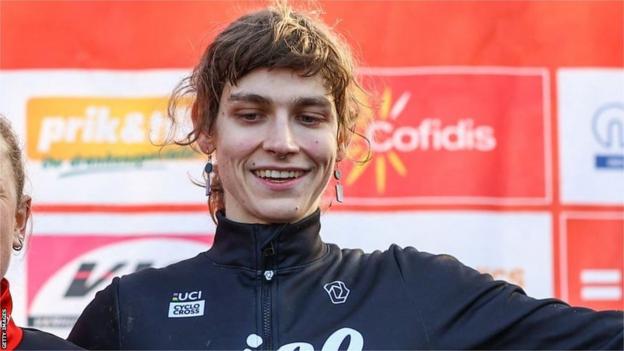
The UCI is to “re-open consultation” around transgender women competing in elite female cycling events.
British Cycling is also considering banning transgender women from elite female competition.
The issue has also been discussed by the UCI’s management committee in Italy this week.
Cycling’s global governing body released a statement on Thursday saying that it is “reopening consultation with the athletes and national federations, and therefore agreed to debate and take an eventual decision at its next meeting, in Glasgow in August”.
The UCI added that it “hears the voices of female athletes and their concerns about an equal playing field for competitors and will take into account all elements, including the evolution of scientific knowledge”.
American three-time Olympian Inga Thompson told BBC Sport that many fellow competitors have contacted her about the issue, asking her to speak up.
“They’re mad, they’re angry,” she said. “They’re asked to be nice and polite but can’t even look at Austin without having rage. They feel ‘we’ve trained our whole life to be here and we don’t have a fair shot at this’.
“This is a policy issue that needs to be addressed. Nobody should be attacking transgender athletes.”
Killips – who started racing in 2019 and also competes in cyclocross – thanked fellow riders for their support after “a week of nonsense on the internet” following her win.
She said on Instagram: “After a week of nonsense on the internet, I’m especially thankful to everyone in the peloton and sport who continue to affirm that Twitter is not real life.
“I love my peers and competitors and am grateful for every opportunity I get to learn and grow as a person and athlete on course together.”
On Tuesday, the UCI had defended its rules, saying in a statement: “The UCI acknowledges that transgender athletes may wish to compete in accordance with their gender identity.”
Currently, the UCI requires transgender women to suppress their testosterone levels to 2.5 nanomoles per litre (nmol/L) for a 24-month period prior to competing in female events.
It toughened it rules on eligibility in 2022, with previous regulations set at 5 nmol/L for 12 months.
The UCI’s transgender policy had been under review after being brought into the spotlight by British rider Emily Bridges, one of cycling’s most high-profile transgender competitors.
Speaking to the BBC, Thompson added: “Austin Killips is competing absolutely within the rules, regulations and policy set forth by the International Cycling Union.
“With that said, policy is always revisited and it needs to be revisited because when this was put forth there wasn’t enough scientific evidence to show whether it was fair or not.”
The UCI’s current policy differs from those of other international governing bodies, such as World Athletics and World Aquatics (previously called Fina), which have banned transgender women from competing in the female category at international events.
Last year, British Cycling said transgender women were no longer able to compete at elite female events it ran after the organisation suspended its current policy.
It is now considering diverging from its global federation and pursuing a similar policy to British Triathlon, which last year became the first British sport to establish a new ‘open’ category in which transgender athletes would compete.
Thompson said that would be “absolutely wonderful”. She added: “They are leading the way for women’s cycling and I applaud their efforts. I’m hopeful that’ll help other countries lead the way and maybe get enough pressure on the UCI to change their policy.”
Thompson also questioned whether, ethically, testosterone suppression should be used for athletes to compete in a classification that otherwise they would not qualify for.
“We shouldn’t be asking these athletes to do this,” she added. “If they want to compete, they should be able to, but not at the exclusion of women – and nobody’s speaking up for transgender men. What about a category for them?
“There are all sorts of classifications [in cycling]. It would be nothing to add another for the inclusion of transgender athletes.”